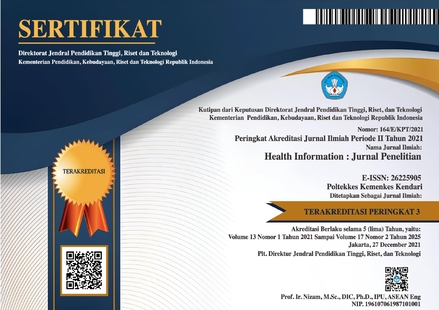Factors Related to Giving Exclusive Breastfeeding in the Working Area of the Poasia Community Health Center, Kendari City, Southeast Sulawesi Province
DOI:
https://doi.org/10.36990/hijp.v10i1.57Keywords:
Exclusive ASIAbstract
Breast milk (ASI) is the best source of nutrition for babies because it contains various nutrients needed in the growth and development of babies. Giving breast milk is highly recommended until the baby is 6 months old (Utami, 2005). Data on Exclusive Breastfeeding at Poasia Health Center in 2015 amounted to 77.07% and based on the results of surveys in several Posyandu in the Poasia Community Health Center working area, most of the visiting babies were given formula milk and complimentary food for breast milk. This shows that the practice of exclusive breastfeeding is still low which can affect the growth and development of infants so that it will affect the quality of human resources. Research Objectives: To find out the factors related to exclusive breastfeeding at Posyandu in the working area of Poasia Health Center, Kendari City, Southeast Sulawesi Province in 2016. Research methods: The research conducted was analytical research with an approach cross-sectional. The study sample was mothers who had babies aged 7 to 24 months in the working area of Poasia Health Center with a total of 77 people. The sampling technique is an accidental sampling. The results of the study: the results of this study were the education of mothers who gave exclusive breastfeeding 80.8% of secondary education (SMA) mothers and those who did not provide exclusive breastfeeding 100% of mothers with higher education. Employment of mothers who provide exclusive breastfeeding 54.8% of working mothers and those who do not provide exclusive breastfeeding 100% of working mothers. The parity of mothers who gave exclusive breastfeeding was 67.7% in mothers with no risk (parity 2-3) and those who did not give exclusive breastfeeding 58.7% in mothers at risk parity (parity 1 and 4), and there was a relationship between education, employment and maternal parity with exclusive breastfeeding in the working area of Kendari City Poasia Health Center with a value of value <0.05.
References
AIMI. 2015. Pekan ASI Sedunia (PAS) Tahun 2015 – Menyusui dan Bekerja: Mari Kita Sukseskan. http://aimi- asi.org/pekan-asi-sedunia- pastahun-2015 diakses 1 Desember 2015
Coad, J dan Dunstall. 2007. Mengenal ASI eksklusif. Jakarta: EGC 6
Fraser,DM dan Cooper M.A. 2009. Myles Buku Ajar Bidan. Jakarta: EGC
Kementerian Kesehatan. R.I 2014. Dirjen Bina Gizi & Kesehatan Ibu Dan Anak. http://www.kemenkes.go.id/a/dirjen- bina-gizi-kesehatan-ibu- dan-anak diakses Maret 2016.
Kementerian Kesehatan. R.I. 2010. Riset Kesehatan Dasar. Kementerian Kesehatan. R.I . 2010. Pedoman Pekan ASI Sedunia (PAS). Jakarta : Kemenkes R.I
Maria, A.S. 2014. Faktor-faktor yang berhubungan dengan pemberian asi Eksklusif di posyandu Tanah Boleng Adonara Kabupaten Flores Timur. Program Studi Keperawatan A. STIK SINT Carolus. Jakarta.
Muchtar, R., 2008. Pentingnya ASI. http://surabaya.webs.com diakses tanggal 23 November 2015.
Notoatmodjo, S. 2007. Metodologi Penelitian Kesehatan. Jakarta : Rineka Cipta.
Notoatmodjo, S. 2003. Pendidikan dan Perilaku Kesehatan. Jakarta : Rineka Cipta. Jakarta
Perinasia. 2004. Bahan Bacaan Manajemen Laktasi Edisi 2. Jakarta.
Prasetyono, D.S. 2009. ASI eksklusif : Pengenalan dan Praktik. Yogyakarta : Diva Press
Utami. R. 2005. Mengenal ASI Eksklusif. Jakarta : Trubus Agriwidya.
Suparyanto, 2010. Konsep Paritas. BKKBN: Jakarta
Supriadi. 2002. Kiat Sukses Menyusui. Buku pegangan seputar manfaat menyusui dan permasalahannya, Jakarta.
Suririnah. 2009. Buku Pintar Merawat Bayi 0- 12 Bulan. Jakarta: Gramedia Pustaka Utama.
Undang-Undang R.I. No. 20 Tahun 2003 Tentang Sistem Pendidikan Nasional.
Wiknjosastro, H. 2012. Ilmu Kebidanan. Jakarta : Yayasan Bina Pustaka Sarwono Prawirohardjo.
Windayanti. 2010. Hubungan Umur dan Tingkat Pendidikan Ibu Terhadap Pemberian ASI Eksklusif di Kabupaten Bengkulu Utara. KTI. Fakultas Ilmu Kesehatan. Universitas Ratu Samban Bengkulu Utara.
WHO, 2004. Breasfeeding Counselling. UNICEF, Nutrition Section, USA, diterjemahkan oleh Janur ADV, HMHB Project: Sultra.
Downloads
Published
How to Cite
Issue
Section
Citation Check
License
Copyright (c) 2018 Feryani, Nursaidah

This work is licensed under a Creative Commons Attribution-ShareAlike 4.0 International License.
Authors retain copyright and grant the journal right of first publication with the work simultaneously licensed under a Creative Commons Attribution-ShareAlike 4.0 International License that allows others to share the work with an acknowledgment of the works authorship and initial publication in this journal and able to enter into separate, additional contractual arrangements for the non-exclusive distribution of the journals published version of the work (e.g., post it to an institutional repository or publish it in a book).















